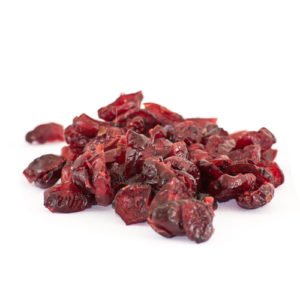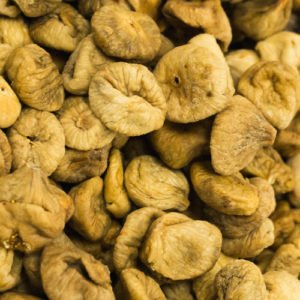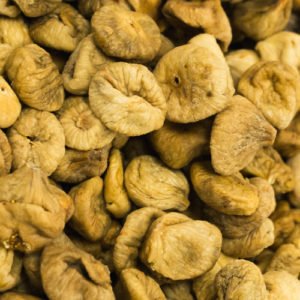Blueberries are dried and preserved in bulk and are popular across the world. They’re popular ingredients for soups and stews, as well as for tarts, cheesecakes, muffins, and other desserts.
The tiny, sweet dehydrated berries are also fun to eat. They make a good snack on their own. They are also easy to sprinkle on salads and on sweet or savory dishes. Their bright color makes simple food presentations more appealing. Dried blueberries have a wide and unique combination of phytonutrients to keep you healthy. Phytonutrients work as strong anti-inflammatory and antioxidant compounds. They’re highly responsible for the range of health benefits you enjoy from eating dried blueberries. Dried blueberries count as one of the more popular fruits and vegetables with the highest antioxidant capacity. They’re rich in anthocyanins, the colored water-soluble naturally-occurring antioxidants responsible for the beautiful deep-blue color of blueberries. Anthocyanins help keep your cardiovascular system healthy. They strengthen the arteries and veins, and promote better blood circulation. They prevent heart disease. Likewise, they keep illnesses like ulcers, glaucoma, and cataract at bay. Dried blueberries have flavonols, hydroxybenzoic acids, hydroxycinnamic acids, and other antioxidants like resveratrol and pterostilbene. These compounds get rid of free radicals from the blood. They protect you from a wide range of diseases, including cancer. They help strengthen your digestive, nervous, and cardiovascular systems. Antibiotics fight infection. However, they may have some side effects, especially when you take them frequently. So, it’s simply better to have a strong innate immune system as your first line of defense against the threat of infection.
When you take dried blueberries, you increase your natural ability to ward off diseases. Dried blueberries are rich in pterostilbene, a beneficial dietary compound that strengthens the immune system. Pterostilbene promotes the activity of the cathelicidin antimicrobial peptide (CAMP) gene, which plays a key role in boosting the body’s natural ability to protect itself from bacterial infection. Dried blueberries also contain flavonoids—natural plant chemicals or phytonutrients with strong anti-inflammatory properties that lower your risk of getting a cold or the flu. A diet that’s high in fat often leads to health conditions like hypertension, inflammation, and other diseases often associated with obesity. By including dried blueberries in your diet, you end up reducing, if not undoing, the adverse effects of including too much fatty food in your diet. Dried blueberries are packed with antioxidants. They help keep your cholesterol level in check. They promote a healthy balance among cholesterols and triglycerides. They even prevent oxygen damage and atherosclerosis or the hardening or clogging of the arteries. By doing all these, dried blueberries shield you from conditions usually associated with stroke and heart attack. As such, the fruit promotes heart health and it cuts down the risk of heart disease. You enjoy better brain function if dried blueberries are a regular part of your diet. Dried blueberries have components that improve memory and slow down age-related cognitive diseases. Studies show that people who eat dried blueberries are less inclined to develop Parkinson’s disease and other similar brain conditions. They’re also more likely to have a healthier nervous system as flavonoids lower oxidative stress in the nerve cells.
Dried blueberries are highly recommended for people who suffer from insulin resistance and diabetes. They help regulate blood sugar and control obesity. Dried blueberries have a low glycemic index (GI) value. In other words, it takes a longer time for the body to digest and absorb them. Because of this, they cause a smaller and slower rise in your blood sugar levels. They don’t cause your insulin or blood sugar levels to spike. They also make you feel full for a longer period of time. It’s important to keep your blood sugar levels even, particularly if you are at risk of getting type-2 diabetes. Dried blueberries and other foods with low GI values are likewise recommended for people who are at risk for obesity, heart disease, and cancer. Dried blueberries are packed with dietary fiber. They contribute to easy digestion. Aside from that, they’re an amazing source of vitamins; they contain almost all the vitamins you need to keep your body healthy and strong. They are particularly rich in vitamin C, but they also contain vitamins A, K, E and B. Because of their vitamin C content, dried blueberries actually support the immune system. They keep your gums healthy as well, in addition to boosting collagen formation.
The vitamin C in dried blueberries, combined with vitamins E and A help reduce the adverse effects of free radicals on the body. Vitamin K, on the other hand, enhances bone health. It also supports proper clot formation. Furthermore, dried blueberries are rich in vitamin B6, pantothenic acid, niacin, folic acid, and riboflavin. These work together in keeping the metabolism of fats, proteins, and carbohydrates as efficient as possible. Dried blueberries are also rich in minerals. They have iron, copper, manganese, zinc, and potassium. Manganese helps the body produce new cartilage, heals wounds, and improves metabolism. Potassium, on the other hand, is essential to cell production. It regulates blood pressure and heart rate as well. As for iron and copper, these are essential for the healthy production of red blood cells. Dried blueberries have low sugar content. A cup of blueberries only has about 15 grams of sugar—the same amount of sugar in a small apple. The bioactive properties of dried blueberries tend to nullify any adverse effects that the sugar may have on the body.











kathir462023 –
Nice blueberry!! Super taste at a reasonable price. Like it very much. Good packing…